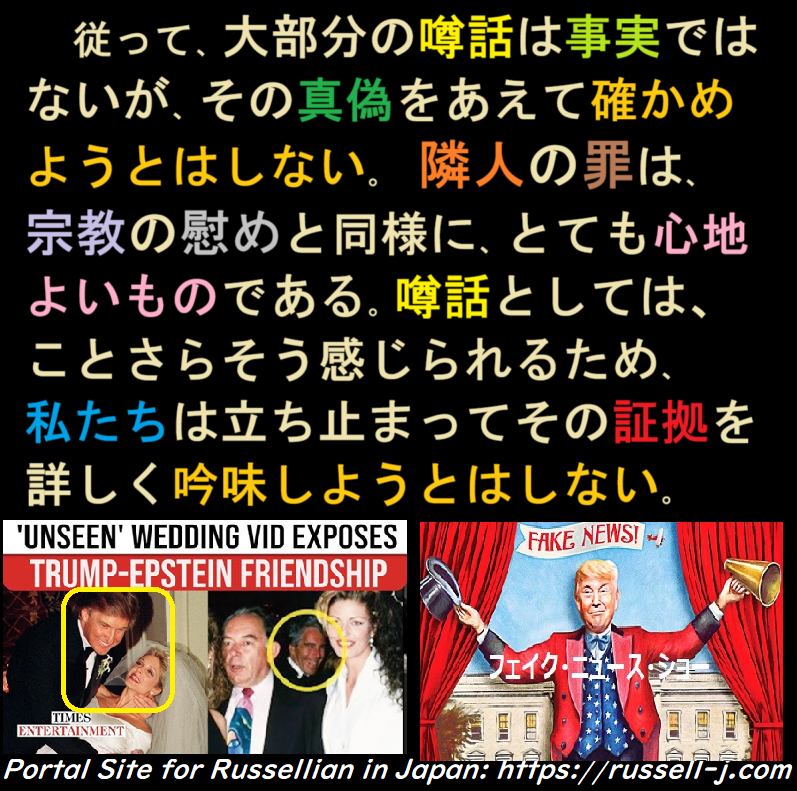
従って、大部分の噂話は事実ではないが、その真偽をあえて確かめようとはしない。 隣人の罪は、宗教の慰めと同様に、とても心地よいものである。噂話としては、ことさらそう感じられるため、私たちは立ち止まってその証拠を詳しく吟味しようとはしない。
Accordingly most gossip is untrue, but care is taken not to verify it. Our neighbour's sins, like the consolations of religion, are so agreeable that we do not stop to scrutinize the evidence closely.
Source: On Education, especially in early childhood, 1926, by Bertrand Russell
More info.: https://russell-j.com/beginner/OE02-190.HTM
<寸言>
世の中には「事実」が溢れています。どんなに懐疑的な人でも、提示される「事実」の真偽を一つひとつ確かめる時間などなく、大部分を正しいものとして受け入れざるを得ません。もちろん、その「事実」を述べているのが信頼できる組織や人物かによって、信じる度合いは変わってきます。 たとえば、マスコミ報道では、海外のニュースについては、NHKよりもBBCのほうがより正確だろうと思う人も多いでしょう。
一党独裁の共産主義国や国家主義的な国の指導者の発言は信用できないことが多いため、多くの人がそのまま鵜呑みにしません。ところが、困ったことに、かつて民主主義国のチャンピオンとされたアメリカの指導者までもが信用を損なう発言を日々繰り返し、世界に混乱をもたらしています。
トランプ氏は今年(2025年)3月にアメリカ大統領に返り咲きました。「事実を述べること」など退屈だと彼は思っているせいなのか、彼の発言はどこまで正確で、どの部分が誇張や誤りか、すぐには判断できないものが多く、私たちは何を信じたらよいのかわからない状態に度々陥っています。
「本日のラッセルの言葉」は、嘘やデマを本当のことだと思い込みやすい人間性に対する注意喚起です。日々、少しずつでも自分で真偽を確かめる習慣を持てば、嘘やデマに騙されにくくなるはずです。自分の好き嫌いはいったんわきにおいて、まずは「事実」を確認する習慣を身につければ、しだいに的確な判断ができるようになるのではないでしょうか?
The world is overflowing with "facts." Even the most skeptical individuals don't have time to verify every claim presented to them, and so they are inevitably forced to accept most of them as true. Of course, how much we trust a given "fact" depends on whether it comes from a reliable organization or person.
For example, when it comes to international news, many people might consider the BBC more accurate than NHK.
In countries governed by one-party communist regimes or authoritarian nationalism, people tend to be cautious about taking their leaders' words at face value, knowing how often such statements are unreliable. The troubling reality, however, is that even the leaders of the United States -- once regarded as a champion of democracy -- have been making increasingly untrustworthy statements, sowing confusion around the world.
Donald Trump returned to the presidency in March 2025. Perhaps because he finds "stating the facts" too dull, many of his statements are difficult to evaluate at face value -- it's not easy to tell what's accurate and what's exaggerated or outright false. As a result, we often find ourselves unsure of what to believe.
Today's words from Bertrand Russell serve as a warning about how easily human beings are misled by lies and misinformation. If we make it a daily habit -- even just a little -- to verify the truth for ourselves, we can become less vulnerable to falsehoods. If we can set aside our personal likes and dislikes and commit first to confirming the facts, we may gradually develop the ability to make sounder judgments.